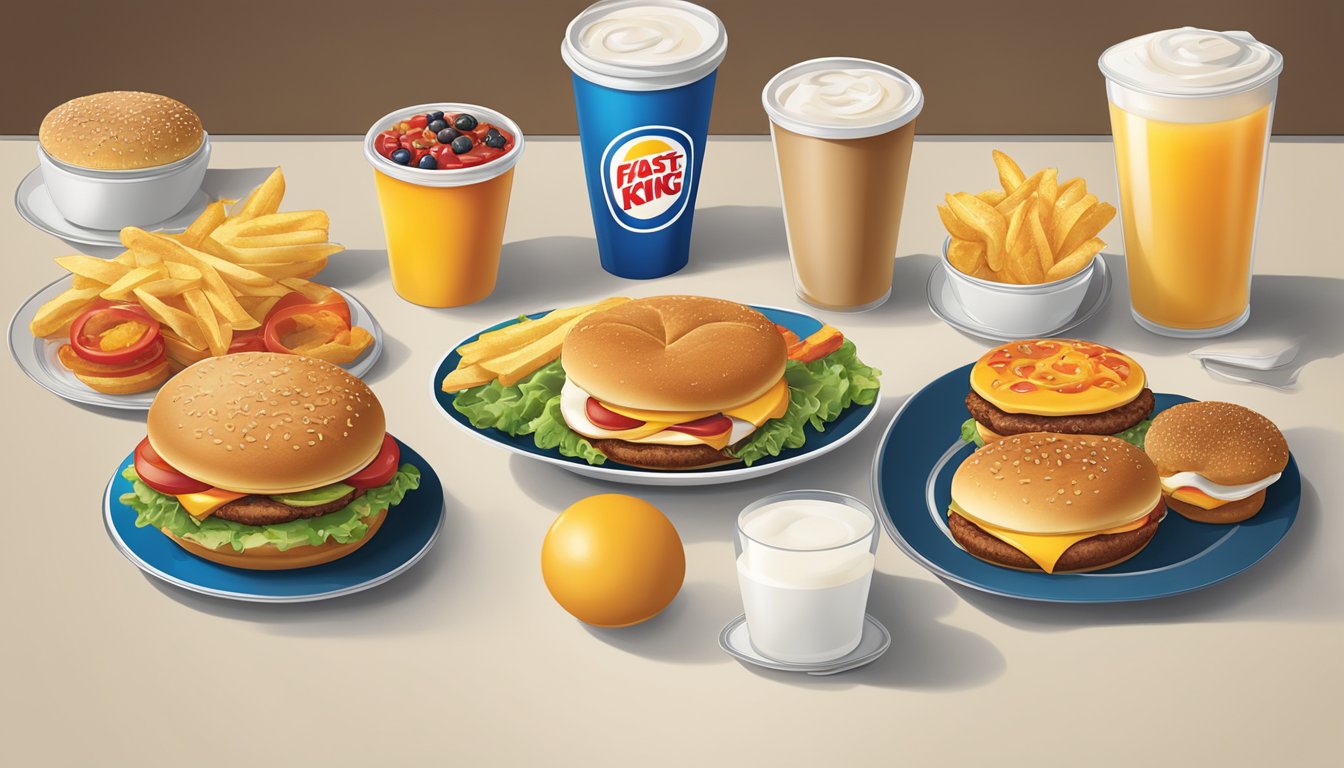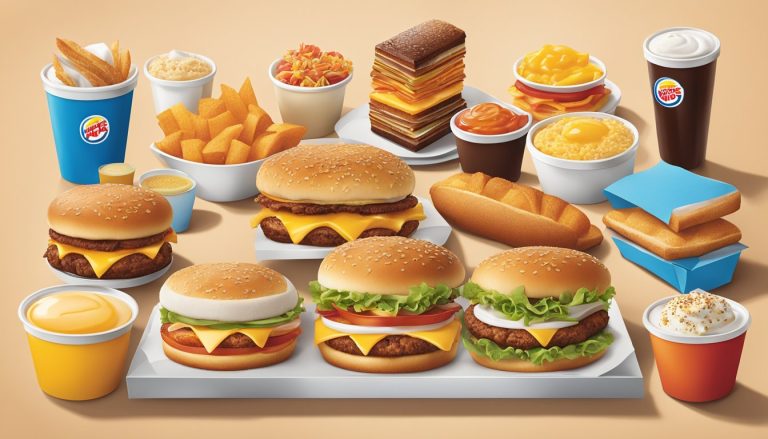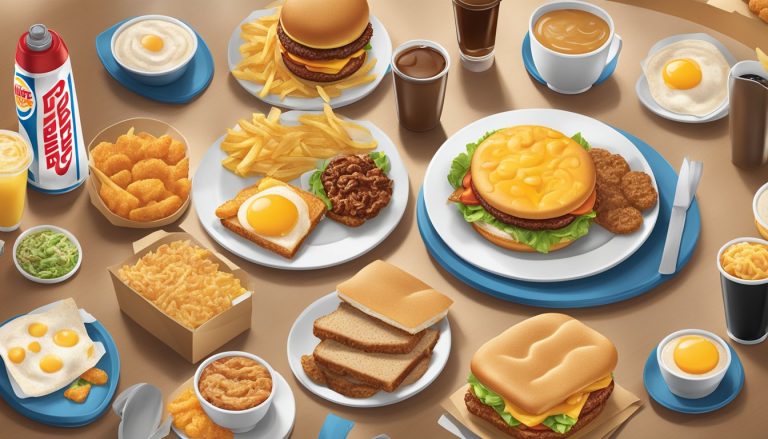Burger King’s breakfast strategy has sent ripples through the fast food industry, prompting competitors to reassess their morning offerings. The introduction of the BK Café platform and innovative promotions like the $5 monthly coffee subscription have energized Burger King’s breakfast business. These moves have led to a 50% increase in coffee unit volumes, highlighting the growing importance of the breakfast segment in the fast food market.
Rivals like McDonald’s and Panera Bread have taken notice, adjusting their own strategies to maintain their share of the early morning customer base. As Burger King refines its coffee experience and expands its breakfast menu, other chains are forced to innovate and improve their offerings to stay competitive. This shift in the breakfast landscape reflects the changing habits of consumers, who increasingly seek convenient and quality morning meal options.
The impact of Burger King’s breakfast push extends beyond direct fast food competitors. Even coffee-focused chains like Starbucks are feeling the pressure, as evidenced by their strong sales growth in response to evolving consumer preferences. As Burger King continues to enhance its breakfast offerings, the entire fast food industry must adapt to meet the growing demand for diverse, convenient, and appealing morning meal choices.
Historical Context and Market Evolution

Fast food breakfast offerings transformed the industry landscape, with major chains vying for morning customers. Burger King emerged as a significant player, shaping its position among top fast-food brands globally.
Rise of Breakfast Offerings in Fast Food
McDonald’s introduced the Egg McMuffin in 1972, sparking the breakfast revolution in fast food. Other chains quickly followed suit, recognizing the lucrative morning market. By the 1980s, breakfast menus became standard across major fast-food restaurants.
Fast-food breakfast items typically included egg sandwiches, pancakes, and coffee. These offerings catered to busy consumers seeking quick, convenient morning meals. The breakfast segment grew rapidly, becoming a key revenue driver for many chains.
Burger King’s Position in Fast-Food Chains
Burger King entered the breakfast market in 1979 with its “Croissan’wich”. This move positioned BK as a direct competitor to McDonald’s in the morning segment. The chain expanded its breakfast menu over time, adding items like French toast sticks and breakfast burritos.
By 2025, Burger King operates as part of Restaurant Brands International, a global fast-food powerhouse. BK’s breakfast offerings play a crucial role in its overall strategy, helping maintain its position as the second-largest hamburger chain worldwide.
The company continues to innovate its breakfast menu, adapting to changing consumer preferences and health trends. BK’s breakfast success has influenced competitors, spurring ongoing menu development across the fast-food industry.
Burger King’s Breakfast Menu
Burger King’s breakfast menu offers a diverse range of items, from classic sandwiches to innovative options. The menu balances traditional favorites with healthier choices and product innovations to cater to changing consumer preferences.
Overview of Offerings
Burger King’s breakfast menu features a variety of options to suit different tastes. The iconic Croissan’wich remains a popular choice, combining eggs, cheese, and meat on a buttery croissant. Breakfast platters provide heartier options for those seeking a full meal.
Hash browns are a staple side item. For those on the go, breakfast burritos offer a portable option. The menu also includes lighter fare like oatmeal and fruit cups.
Beverage options range from coffee and orange juice to soft drinks. Combo meals allow customers to pair sandwiches with sides and drinks for better value.
Nutritional Value
Burger King offers nutritional information for all breakfast items, allowing customers to make informed choices. Many breakfast sandwiches contain significant protein, but can be high in calories and sodium.
Healthier options include:
- Egg and cheese Croissan’wich (340 calories)
- Oatmeal (170 calories)
- Apple slices (35 calories)
For those watching their intake, options like removing cheese or choosing smaller portions can reduce calorie and fat content. Burger King has also introduced lower-calorie alternatives to traditional menu items.
Product Innovation
Burger King continually updates its breakfast menu to stay competitive. Recent innovations include:
- Plant-based options: Impossible Croissan’wich for vegetarian customers
- Maple Waffle Sandwich: Combining sweet and savory flavors
- French Toast Sticks: A unique, dippable breakfast item
The chain also experiments with limited-time offerings to gauge customer interest and keep the menu fresh. These innovations often incorporate trending flavors or address specific dietary preferences.
Burger King adapts its menu to local tastes in different markets, offering region-specific items alongside core breakfast options.
Breakfast Menu Impact Analysis
Burger King’s breakfast menu has significantly influenced the fast-food industry. The introduction of the Croissan’wich in the 1980s prompted competitors to diversify their breakfast sandwich options.
The chain’s focus on value pricing has pressured other fast-food restaurants to offer competitive breakfast deals. This has led to increased breakfast sales across the industry.
Burger King’s breakfast menu performance:
- Contributes approximately 15-20% of daily sales
- Helps drive morning customer traffic
- Faces stiff competition from other chains
The introduction of all-day breakfast at some competitors has challenged Burger King to innovate further and consider extending breakfast hours at select locations.
Competitive Analysis

Burger King’s breakfast offerings have significantly impacted the fast food landscape. This analysis examines how BK’s breakfast compares to competitors, its market differentiation, and the ripple effects on rival strategies.
Comparison with Competitor Offerings
Burger King’s breakfast menu stands out with unique items like the Croissan’wich and French Toast Sticks. These offerings compete directly with McDonald’s Egg McMuffin and Hotcakes. BK’s menu emphasizes customization, allowing customers to “Have It Your Way” even at breakfast.
The Value Menu at Burger King features several breakfast items under $5, rivaling McDonald’s and Wendy’s pricing strategies. This approach aims to attract budget-conscious consumers while maintaining competitive margins.
BK’s breakfast hours typically extend longer than some competitors, providing an advantage in capturing late-morning customers.
Differentiation and Market Penetration
Burger King has leveraged its flame-grilled reputation to differentiate breakfast offerings. The introduction of items like the Breakfast Burger blends lunch and breakfast, appealing to a broader audience.
To increase market penetration, BK has:
- Expanded drive-thru capabilities
- Improved mobile ordering options
- Launched targeted marketing campaigns
These initiatives have helped BK capture a larger share of the breakfast market, challenging established players like McDonald’s and emerging competitors like Taco Bell.
Impact of BK’s Breakfast on Competitor Strategies
BK’s aggressive breakfast push has prompted responses from competitors. McDonald’s expanded its all-day breakfast menu before scaling back during the pandemic. Wendy’s finally entered the breakfast market in 2020, partly in response to BK’s success.
Competitors have adapted by:
- Introducing new menu items
- Enhancing digital ordering platforms
- Offering breakfast-specific promotions
Taco Bell revamped its breakfast menu, while Dunkin’ invested in espresso machines to compete with BK’s coffee offerings.
BK’s breakfast innovations have forced competitors to reevaluate their morning strategies, leading to increased investment and menu diversification across the industry.
Consumer Perception and Brand Image
Brand image and consumer perception significantly influence fast food breakfast offerings. Customer experiences shape loyalty, while health consciousness drives menu changes. Effective management of negative publicity also impacts public perception.
Customer Experience and Loyalty
BK’s breakfast menu impacts customer loyalty through dining experiences. Quick service and consistent food quality build positive brand associations. Convenient drive-thru options and mobile ordering enhance accessibility. Personalized rewards programs incentivize repeat visits.
Menu variety caters to different tastes, increasing customer satisfaction. Signature items like the Croissan’wich differentiate BK from competitors. Friendly staff interactions contribute to a positive atmosphere. Clean, well-maintained restaurants reinforce brand image.
Health Consciousness and Dietary Preferences
Rising health awareness influences BK’s breakfast offerings. Low-calorie options appeal to weight-conscious consumers. Egg white sandwiches and oatmeal provide healthier alternatives. Vegetarian choices cater to plant-based diets.
Allergen information helps customers with dietary restrictions. Portion control options support calorie management. Fresh fruit sides offer nutritious add-ons. Transparency in ingredient sourcing builds trust. Competitors respond with similar health-focused items to stay relevant.
Negative Publicity Management
BK addresses negative publicity to maintain brand image. Quick responses to food safety concerns reassure customers. Clear communication during ingredient controversies preserves trust. Corporate social responsibility initiatives offset negative perceptions.
Proactive measures prevent potential scandals. Transparent supply chain practices demonstrate commitment to quality. Community engagement programs build goodwill. Social media monitoring allows rapid response to customer complaints. Competitor missteps create opportunities for BK to differentiate its brand image.
Operational Insights
Burger King’s breakfast strategy relies heavily on its operational capabilities and business model. The company leverages economies of scale, franchising, and supply chain management to compete effectively in the morning meal segment.
Economies of Scale and Franchising
Burger King’s extensive franchise network enables rapid implementation of new breakfast offerings across markets. The company operates over 18,000 restaurants globally, allowing it to spread fixed costs and negotiate better supplier deals. This scale advantage helps BK price breakfast items competitively while maintaining profitability.
Franchising also facilitates local market adaptation. Individual franchisees can tailor breakfast menus to regional preferences, increasing customer appeal. The franchise model reduces corporate capital requirements, as franchisees bear most store-level investment costs.
Supply Chain and Economies
BK’s robust supply chain supports its breakfast expansion. The company leverages existing supplier relationships to source ingredients efficiently. Bulk purchasing power helps control food costs, a critical factor in the price-sensitive breakfast segment.
Centralized food production and distribution centers enable consistent product quality across locations. This infrastructure allows BK to quickly roll out new breakfast items chain-wide. The company’s data analytics capabilities inform inventory management, reducing waste and ensuring product availability during peak morning hours.
Marketing and Advertising Strategies
Burger King’s breakfast marketing efforts focus on creative campaigns and strategic partnerships to attract customers and compete with rivals. These initiatives aim to boost brand awareness and drive sales during the morning daypart.
Promotional Activities and Campaigns
Burger King employs bold marketing tactics to promote its breakfast offerings. The company leverages social media platforms to engage customers with witty posts and interactive content. Television commercials showcase appetizing visuals of breakfast items, emphasizing their quality and value.
Limited-time promotions, such as “2 for $4” breakfast sandwich deals, entice budget-conscious consumers. Burger King also utilizes mobile apps and loyalty programs to offer exclusive breakfast discounts and rewards.
Eye-catching in-store displays and outdoor advertising highlight new breakfast menu items and special offers. The brand’s signature “Wake Up with the King” campaign features the iconic Burger King mascot in humorous breakfast-themed scenarios.
Strategic Partnerships and Collaborations
Burger King forms strategic alliances to enhance its breakfast marketing reach. Partnerships with popular coffee brands strengthen its morning beverage offerings and appeal to caffeine-seeking customers.
Collaborations with food delivery services expand accessibility, catering to the growing demand for convenient breakfast options. The company also teams up with sports organizations and events to promote breakfast items during morning broadcasts.
Celebrity endorsements and influencer partnerships help Burger King target specific demographics and increase breakfast menu visibility. Co-branded promotions with complementary businesses, such as ride-sharing services, create unique breakfast-focused marketing opportunities.
Industry Challenges and Burger King’s Response

Burger King faces several key challenges in the fast food industry. The company has implemented strategic responses to address global economic pressures, evolving consumer preferences, and competitive threats.
Global Recession and Industry Response
Economic downturns impact fast food chains significantly. During recessions, consumers tend to reduce discretionary spending, including eating out. Burger King has responded by:
• Offering value menu items to attract budget-conscious customers
• Expanding delivery and takeout options
• Streamlining operations to reduce costs
The company has also focused on international expansion to diversify revenue streams. This strategy helps offset potential losses in struggling markets.
Product Customization and Innovation
Changing consumer tastes present ongoing challenges. Burger King has adapted by:
• Introducing customizable menu options
• Launching plant-based alternatives like the Impossible Whopper
• Developing regional menu items tailored to local preferences
These innovations aim to attract a wider customer base and keep the menu fresh and exciting.
SWOT Analysis
Strengths:
• Strong brand recognition
• Global presence in over 100 countries
• Iconic products like the Whopper
Weaknesses:
• Limited breakfast market share
• Reliance on U.S. market for significant revenue
Opportunities:
• Expansion in emerging markets
• Growth in delivery and digital ordering
Threats:
• Intense competition from other fast food chains
• Increasing health consciousness among consumers
Burger King’s SWOT analysis reveals areas for improvement and potential growth strategies. The company continues to leverage its strengths while addressing weaknesses to maintain competitiveness in the fast food industry.
Future Projections

Burger King’s breakfast strategy will likely evolve to meet shifting consumer preferences and expand globally. The chain faces opportunities and challenges as it aims to grow its morning market share.
Adapting to Changing Consumer Demands
BK will need to innovate its breakfast menu to cater to health-conscious customers. Plant-based options and lower-calorie items may become more prominent. The chain could introduce customizable breakfast bowls or wraps to appeal to younger demographics.
Digital ordering and delivery will likely play a bigger role. BK may invest in mobile app features specifically for breakfast, such as pre-ordering and loyalty rewards. Drive-thru lanes optimized for morning rush could help compete with coffee shop chains.
Value will remain key. BK might offer more breakfast combo deals or continue with subscription models like its $5 monthly coffee program to drive repeat visits.
Global Expansion and Local Market Strategies
Burger King will aim to grow its breakfast presence in international markets. This expansion will require adapting menus to local tastes. In Asia, rice-based breakfast items could be introduced. European locations may focus on grab-and-go options for commuters.
The chain will face varied competition globally. In some countries, BK will compete with local cafes and bakeries rather than other fast food chains. This may necessitate partnerships with popular local brands or ingredients.
Marketing strategies will be tailored by region. BK might emphasize convenience in busy urban markets, while focusing on quality ingredients in more food-conscious areas.




